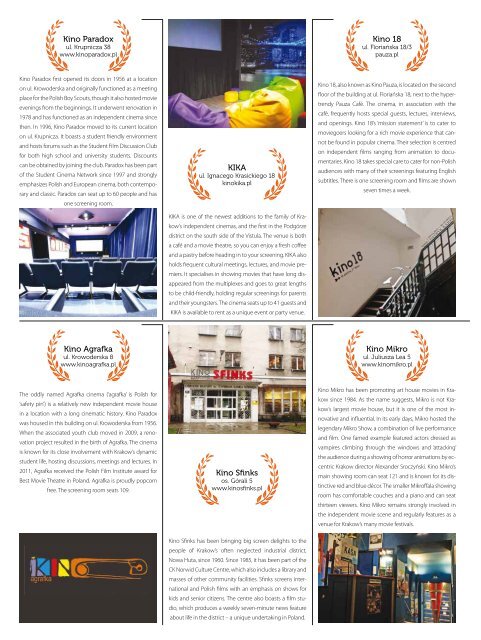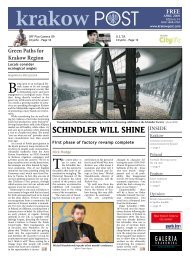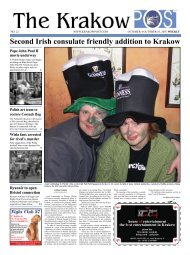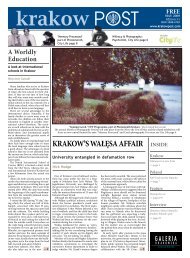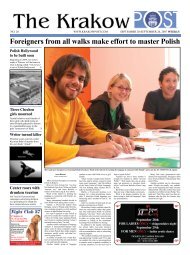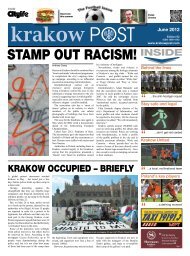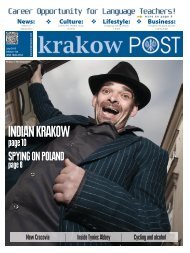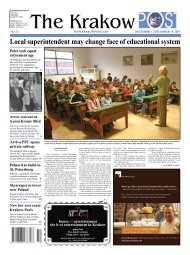News: Culture: Lifestyle: Business: Krakow ... - Krakow Post
News: Culture: Lifestyle: Business: Krakow ... - Krakow Post
News: Culture: Lifestyle: Business: Krakow ... - Krakow Post
Create successful ePaper yourself
Turn your PDF publications into a flip-book with our unique Google optimized e-Paper software.
Kino Paradox<br />
ul. Krupnicza 38<br />
www.kinoparadox.pl<br />
Kino 18<br />
ul. Floriańska 18/3<br />
pauza.pl<br />
Kino Paradox first opened its doors in 1956 at a location<br />
on ul. Krowoderska and originally functioned as a meeting<br />
place for the Polish Boy Scouts, though it also hosted movie<br />
evenings from the beginnings. It underwent renovation in<br />
1978 and has functioned as an independent cinema since<br />
then. In 1996, Kino Paradox moved to its current location<br />
on ul. Krupnicza. It boasts a student friendly environment<br />
and hosts forums such as the Student Film Discussion Club<br />
for both high school and university students. Discounts<br />
can be obtained by joining the club. Paradox has been part<br />
of the Student Cinema Network since 1997 and strongly<br />
emphasizes Polish and European cinema, both contemporary<br />
and classic. Paradox can seat up to 60 people and has<br />
one screening room.<br />
KIKA<br />
ul. Ignacego Krasickiego 18<br />
kinokika.pl<br />
KIKA is one of the newest additions to the family of <strong>Krakow</strong>’s<br />
independent cinemas, and the first in the Podgórze<br />
district on the south side of the Vistula. The venue is both<br />
a café and a movie theatre, so you can enjoy a fresh coffee<br />
and a pastry before heading in to your screening. KIKA also<br />
holds frequent cultural meetings, lectures, and movie premiers.<br />
It specialises in showing movies that have long disappeared<br />
from the multiplexes and goes to great lengths<br />
to be child-friendly, holding regular screenings for parents<br />
and their youngsters. The cinema seats up to 41 guests and<br />
KIKA is available to rent as a unique event or party venue.<br />
Kino 18, also known as Kino Pauza, is located on the second<br />
floor of the building at ul. Floriańska 18, next to the hypertrendy<br />
Pauza Café. The cinema, in association with the<br />
café, frequently hosts special guests, lectures, interviews,<br />
and openings. Kino 18’s ‘mission statement’ is to cater to<br />
moviegoers looking for a rich movie experience that cannot<br />
be found in popular cinema. Their selection is centred<br />
on independent films ranging from animation to documentaries.<br />
Kino 18 takes special care to cater for non-Polish<br />
audiences with many of their screenings featuring English<br />
subtitles. There is one screening room and films are shown<br />
seven times a week.<br />
Kino Agrafka<br />
ul. Krowoderska 8<br />
www.kinoagrafka.pl<br />
Kino Mikro<br />
ul. Juliusza Lea 5<br />
www.kinomikro.pl<br />
The oddly named Agrafka cinema (‘agrafka’ is Polish for<br />
‘safety pin’) is a relatively new independent movie house<br />
in a location with a long cinematic history. Kino Paradox<br />
was housed in this building on ul. Krowoderska from 1956.<br />
When the associated youth club moved in 2009, a renovation<br />
project resulted in the birth of Agrafka. The cinema<br />
is known for its close involvement with <strong>Krakow</strong>’s dynamic<br />
student life, hosting discussions, meetings and lectures. In<br />
2011, Agrafka received the Polish Film Institute award for<br />
Best Movie Theatre in Poland. Agrafka is proudly popcorn<br />
free. The screening room seats 109.<br />
Kino Sfinks<br />
os. Górali 5<br />
www.kinosfinks.pl<br />
Kino Mikro has been promoting art house movies in <strong>Krakow</strong><br />
since 1984. As the name suggests, Mikro is not <strong>Krakow</strong>’s<br />
largest movie house, but it is one of the most innovative<br />
and influential. In its early days, Mikro hosted the<br />
legendary Mikro Show, a combination of live performance<br />
and film. One famed example featured actors dressed as<br />
vampires climbing through the windows and ‘attacking’<br />
the audience during a showing of horror animations by eccentric<br />
<strong>Krakow</strong> director Alexander Sroczyński. Kino Mikro’s<br />
main showing room can seat 121 and is known for its distinctive<br />
red and blue décor. The smaller Mikroffala showing<br />
room has comfortable couches and a piano and can seat<br />
thirteen viewers. Kino Mikro remains strongly involved in<br />
the independent movie scene and regularly features as a<br />
venue for <strong>Krakow</strong>’s many movie festivals.<br />
Kino Sfinks has been bringing big screen delights to the<br />
people of <strong>Krakow</strong>’s often neglected industrial district,<br />
Nowa Huta, since 1960. Since 1985, it has been part of the<br />
CK Norwid <strong>Culture</strong> Centre, which also includes a library and<br />
masses of other community facilities. Sfinks screens international<br />
and Polish films with an emphasis on shows for<br />
kids and senior citizens. The centre also boasts a film studio,<br />
which produces a weekly seven-minute news feature<br />
about life in the district – a unique undertaking in Poland.


